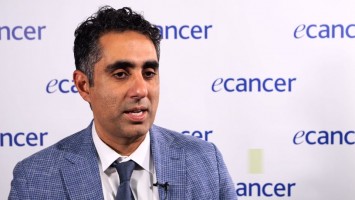Hereditary Breast and Ovarian Cancers Meeting 2011, New York, USA
Genetic mutations as causes of cancer
Dr Henry Lynch – Creighton University, Omaha, USA
Henry, the Henry Lynch. I know you’re a very modest man but you are an absolute star in the horizon and in the galaxy of…
Thank you, you’re making my head swell dramatically.
Thank you so much for the talk you gave today and coming to ecancer.tv just to give us a very short breakdown of it. Now you were saying that in the sixties you were collecting family histories and there was no genetics and so on, it was a different ball game then when you started doing the work that led to the Lynch syndrome. Tough?
Absolutely. It was tough and it was discouraging because we couldn’t get any funds or grants and the recognition of what we were talking about was nil so it was frustrating.
Cancer wasn’t supposed to run in families, was that it?
Exactly, and of course, as you know, it was during the environmental and viral age when everything was supposedly related to a virus theory and that did give emphasis against genetics unfortunately.
But you carried on.
We carried on, yes.
And you developed these families and you began to convince people that there really were hereditary syndromes, you call them, and you’re not for just hereditary breast or just hereditary ovary, you are a syndrome man, why?
Yes. It’s been so exciting seeing what has played out in the breast story and then also in the Lynch syndrome story. So when you’re ascertaining cancer of any type, any histologic variant, and you see it running in families, you wonder what else goes with that in the family like in the Li-Fraumeni syndrome. Early on we and Li and Fraumeni and others began recognising that it was a whole litany of different cancer types. We found the same thing in the Lynch syndrome and we’re still finding other cancers like more recently breast cancer and prostate; now we’re linking identical lesions in the Lynch syndrome.
And prostate gets in there too and pancreas and leukaemia and a variety of others?
Prostate, yes, and pancreas, many, yes indeed.
So you’re the godfather of the whole movement, do you approve of what’s happening now in the field? You’re still very active. The advent of the genetic probes has unquestionably changed the pace.
Sure, very exciting.
We’ve stepped up into overdrive.
Very exciting.
What are we going to do with these genes, are there more to come?
I’m sure there are more to come and these will be low penetrant genes that may explain the bulk of breast and other cancers where we don’t have any basis, other than saying there’s familial clustering. And we don’t know the magnitude, necessarily, nor the etiology of that familial clustering. This is where our molecular genetic colleagues are delving very deeply into the possibility of low penetrant genes.
How do you see it all shaping up now? We’ve had talks today about the counselling part of the business, the surveillance, the sophisticated NMR machines that might one day do without contrast etc., where do you think we’re going to go next? Where are the big challenges in your experience?
I’m happy to have you ask that question because I think that the more we learn about the genetic basis and particularly the molecular background, we’ll be able to mount better pharmacologic approaches. We may be able to even get to the point where we’re able to decide whether radiation therapy or whether surgery is the most effective approach for some of these cancers. But major interest will be in the pharmacogenetics and how this plays out in a particular molecular genetic setting.
And that will be prevention as well as medical.
That will be prevention and maybe even therapy.
And a young scientist or a young doctor coming into this field, what do you say to them?
Well many of them are already making decisions, because it’s so exciting, about hereditary cancer and learning more about molecular genetics and using it effectively in families.
So we’re growing up some Lynches for the future, are we?
I think so, absolutely.
Henry, thank you so much for giving us your time.
Thank you, I appreciate this.
Terrific, thank you.








